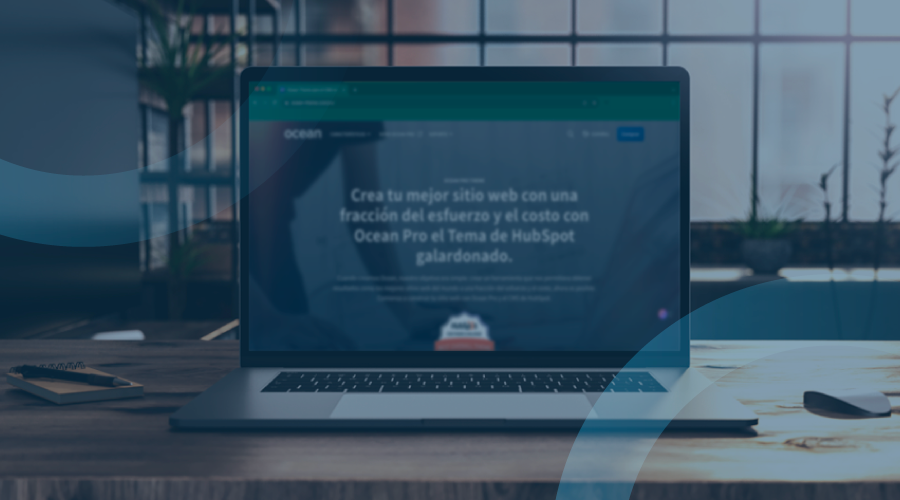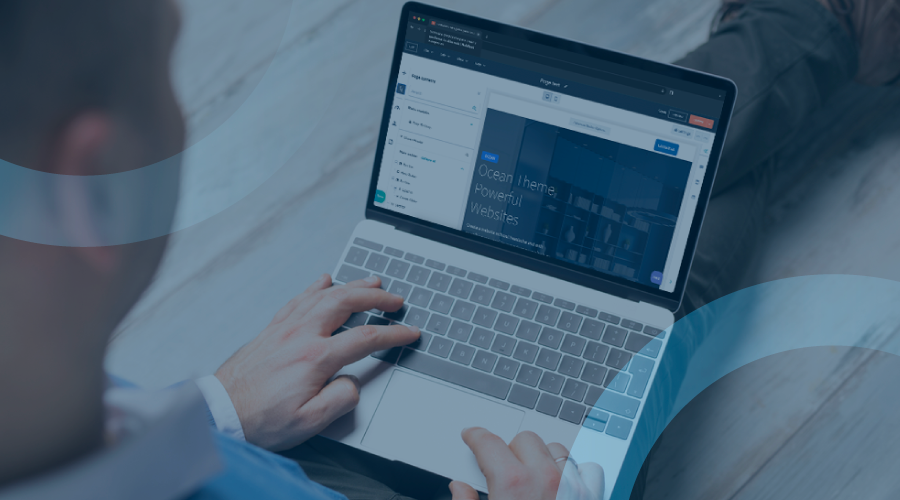Web speed can make a difference when it comes to attracting users and potential customers because people are increasingly less willing to wait for a website to load. They seek immediacy, and if it doesn't happen, they abandon the pages.
This can represent a serious problem for businesses as their business opportunities decrease due to this element.
Fortunately, there are several solutions, and one of them is Ocean Theme (Starter and Pro), a HubSpot theme that helps you improve your site's performance easily and effectively. Do you want to learn more about it? Stay with me!
First, let's see what the term "web speed" refers to...
What is web speed?
Web speed refers to the time it takes for a website to fully load its content in a user's web browser.
This can vary depending on various factors such as the size of the page's files, the quality of the website's code, the user's internet connection speed, and server performance.
Web speed is not only about how long a page takes to fully display but also about how the content loads.
Users can start interacting with a website before it fully appears, so it's important for critical elements like navigation menus and main content to appear quickly.
Why is web speed important?
Web speed is vital for several reasons; let me present 5 of the most important ones:
1. User Experience
A fast website enhances people's perception and how they navigate through pages.
Users don't want to wait for a page to load; they want to access the content immediately. A slow website can frustrate them and make them leave, something no company wants, right?
2. SEO
Google has confirmed that speed is a factor in its ranking algorithm. Faster websites have a higher chance of ranking at the top of search results.
This helps you in many ways, as the top positions capture more than 80-85% of user clicks, generating much more traffic than those below the fifth position.
Certainly, other factors come into play, such as content quality, overall web optimization, etc., but speed is one of them, so you shouldn't neglect it.
3. Conversion
It can also directly affect conversion rates because users are more likely to take a desired action, such as making a purchase or completing a form, on a site that loads quickly or operates smoothly.
Conversion rates drop significantly when a website becomes slower. According to a study by Maismedia, when pages load in 1 second, the conversion rate is nearly 40%; at 2 seconds, it's 34%; at 3 seconds, it's 29%; and at 5 seconds, it's 20%, meaning it's halved.
4. User Retention
People are more likely to return to a website that loads quickly and never consider those that are too slow (more than 4-5 seconds).
For example, if someone visits an e-commerce site that doesn't display information quickly, they're likely to look for the same product on another site. I'm sure that has happened to you, right?
In this regard, good speed not only helps attract users but also retains them, which can translate into greater brand loyalty and repeat purchases in the long term.
5. Credibility and Professionalism
Web speed can also help establish a company's credibility and professionalism because slow loading can be seen as a reflection of not caring about the user experience.
If a user visits a news portal that takes too long to load, they may question the quality and reliability of the presented news.
In contrast, a fast website that efficiently delivers its content can be seen as more credible and professional, increasing people's trust in the content presented.
How to Improve Your Site's Web Speed
If you have issues with your website's loading speed, don't worry. I'll present 10 strategies to help you optimize this aspect.
1. Audit Your Site
The first step to improving speed is to conduct a comprehensive audit. You can use tools like Google PageSpeed Insights or GTmetrix, which help identify issues that may be slowing down your site.
They provide detailed reports on areas that need improvement, such as image optimization, reducing JavaScript and CSS, and improving server response time.
2. Evaluate Your Current Web Hosting Provider
Your web hosting provider plays a crucial role in your site's speed. If it's hosted on a slow or overloaded server, performance will be affected.
If that's the case, consider switching to a faster provider or upgrading your hosting plan if your current server can't handle your site's traffic.
3. Streamline Your CMS
The content management system (CMS) you use can significantly impact your site's speed.
Ensure your CMS is configured correctly and you're using the latest version. Also, avoid installing unnecessary plugins, as they can slow down your site.
One of the best options for building your website is HubSpot's CMS, as it offers numerous tools to create an optimized, powerful, and tailored website that's also scalable for both short and long-term needs.
4. Use a Customizable Theme Like Ocean Theme
Customizable themes like Ocean Theme in HubSpot can help improve your site's speed. They are designed to be fast and efficient, allowing you to customize your site without dealing with complicated code.
Moreover, some themes are optimized for SEO, including web speed. For example, Ocean Pro continuously receives updates that enhance performance and add options.
5. Consider a Content Delivery Network (CDN)
A CDN is a geographically distributed network of servers that work together to provide fast content delivery to users.
By storing copies of your site in different locations, a CDN can reduce latency and improve your site's loading speed for users worldwide.
6. Optimize Your Images
Large and unoptimized images can significantly slow down your website. Use tools to reduce image size without sacrificing quality.
Also, consider using modern image formats like WebP, which offer better compression than traditional formats like JPEG and PNG.
7. Leverage Caching
Caching can improve loading speed by storing a static version of your site in a user's browser. This means that when someone returns, their browser can display the cached version instead of downloading all the content again.
8. Detect and Correct 404 Errors
404 errors occur when a user tries to access a page that doesn't exist on your website. These are not only bad for user experience but can also slow down your site.
Use 404 error tracking tools to identify and fix these issues.
9. Limit HTTP Requests
Every time a user visits your site, their browser makes a series of HTTP requests to download different parts of it, such as images, scripts, and stylesheets.
The more HTTP requests a browser has to make, the longer it takes to load your site. You can reduce the number by combining your CSS and JavaScript files and using image sprites to combine multiple images into one.
10. Compress File Sizes
Compression can help reduce the size of your CSS, HTML, and JavaScript files, which in turn can improve your site's speed.
Use tools like Gzip to compress your files and make your site load faster.
How Ocean Theme Helps Improve Web Performance
The main goal of Ocean Pro, our most powerful option within Ocean Theme, is to provide users with an optimal browsing experience. To achieve this, the focus is on three key areas: speed, structure and design, and conversions.
Regarding speed, we ensure that the theme is fast and efficient, improving user experience and potentially positively impacting organic web rankings.
In terms of structure and design, our extensive UX/UI experience allows us to identify what information is most important to users and how to present it effectively. We offer numerous customization options to create clear and comprehensive content that can be easily indexed by search engines.
Ocean Pro is the result of years of experience in creating and improving more than 500 websites. We focus on what truly matters to businesses: creating pages with clear content and customized design that maximizes organic traffic and converts visitors into leads.
All of this is based on elements that contribute to maximum web speed performance and many other key optimization factors, including SEO.
Tools for Improving Web Speed
After reading all about web speed, you probably want to know how you can measure your site's web speed, right?
Here are the best tools to help you do just that. Take note and use them!
GTMetrix
It's widely known and comprehensive. GTMetrix is a web speed analysis platform that allows you to evaluate both Google PageSpeed and YSlow from Yahoo! to assess your performance on both search engines.
It also provides related metrics like load time, number of requests, and file sizes, which you can compare with your competitors' pages.
Additionally, it offers a historical view, allowing you to analyze your website's performance over days, months, or even years, helping you learn and make necessary corrections.
Google PageSpeed Insights
PageSpeed Insights is a simple and intuitive tool that quickly shows your site's web speed on both mobile devices and desktop computers.
It's one of the best options because the graphics are easy to interpret, and it provides recommendations on how to improve your site's optimization.
Pingdom
Pingdom is ideal for those who want a straightforward and user-friendly platform to identify what makes a site fast or slow, among other key factors.
You can directly see what affects SEO, your hosting server's response, and more, allowing you to monitor and adjust as needed. It also has a simulated visitor tool to assess the user experience on your pages.
Boost Your Website with Ocean Theme
With what you've learned, I'm sure you're ready to take the leap toward the speed demanded by the audience to rank better on Google and other search engines.
You just need to evaluate your current website, see what needs improvement, and get to work fixing errors and enhancing your results with the help of Ocean Theme, which is optimized for good web speed, among other key optimization factors.
If you don't have a website yet or want to redesign it to have all the advantages of a well-optimized site, get in touch with us! Together, we can create an action plan to provide you with what you need for your company through Ocean Theme.

.png?width=319&height=267&name=gtmetrix_2023%20(1).png)




